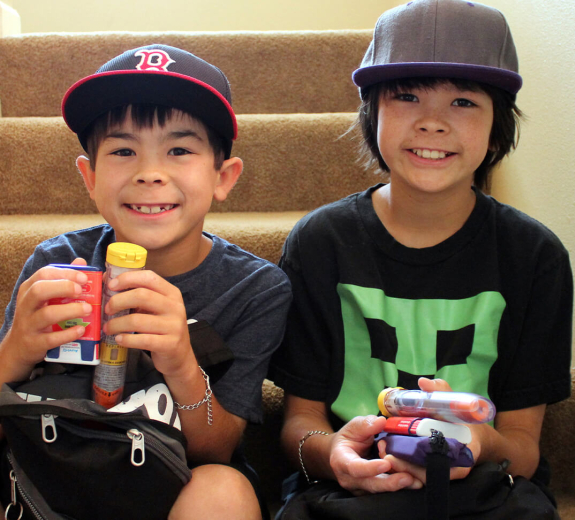
Food Allergies Motivate Boys to Contribute to Research
Most kids take a backpack to school for their books and lunches. But since they were 4 and 7 years old, Aaron and Justin carry their backpacks everywhere. They are filled with lifesaving medications including epinephrine auto injectors and Benadryl. Aaron also carries an asthma inhaler.
The Newton boys both have peanut allergies. Living with a food allergy is different, says Justin, now 12. “You can’t eat everything and you have to look at labels to see if the food is safe. It’s harder to go out with friends because you can’t always eat everything.”
“You have to be careful at every single restaurant,” says Aaron, now 9. “If I’m having a reaction, I need to call 911 and use my EpiPen.” He has twice experienced cross contamination reactions after eating food from restaurants. “That was scary because I couldn’t breathe.”
Their mother, Lori Newton, says that having kids with food allergies requires always being vigilant. “You must always be prepared by carrying medicines, knowing what food will be served, having good alternatives for foods and being hyperaware of your surroundings.
“It’s hard because we enjoy good and adventurous food at restaurants, but we always need to thoroughly check them out first. It’s also difficult when the kids can’t eat what the group is eating at a birthday party or banquet,” she explains. “The vast majority of people understand but some don’t and serve items that are not safe for my kids.”
BRI is a worldwide leader in investigating better ways to diagnose, treat and cure allergies. The Newton family is helping with this work. Justin and Aaron have joined the BRI Allergy and Asthma Biorepository, a list of people with allergies and asthma who are willing to donate a blood sample and provide health information to support scientific research. The information is used by scientists to better understand the causes and long-term health effects of allergies, asthma and immune mediated diseases, as well as to explore better treatment options.
Mary Farrington, MD, a Virginia Mason allergy specialist, informed them about the study. Justin now takes time out from his karate and running to give blood for the research. “I hope that this will be helpful for others and help me too,” he explains. “Maybe there will be a cure someday.” Aaron loves to play baseball and other sports, and hopes to help people with allergies too.
“We talk about the studies and how they help us learn more about their allergies,” says Lori. “It’s exciting to think that our experiences can help us and others so that kids won’t have to worry about not breathing from eating an allergen.” She has high hopes for allergy immunotherapies delivered by patches or orally. “Dr. Farrington believes that we can lead wonderful, productive lives despite our allergies. As my kids grow older, she is helping them take ownership of their care and action plans.”
Did You Know?
-
Up to 15 million Americans have food allergies.
-
This potentially deadly disease affects 1 in every 13 children (under 18 years of age) in the U.S.
-
Allergies occur when the body’s immune system overreacts to a foreign substance (an allergen), such as food, pollen or animal dander, that in most people is generally harmless.
-
People react to the proteins in these allergens with an antibody that releases chemicals that cause sneezing; itching in the nose, eyes and ears; and in rare cases the life-threatening reaction anaphylaxis.
-
Learn more about the Allergies and Asthma Biorepository.
Immuno-what? Hear the latest from BRI
Keep up to date on our latest research, new clinical trials and exciting publications.


